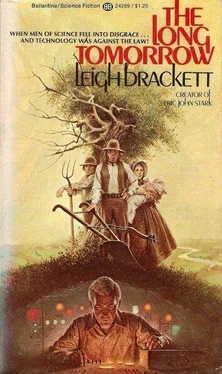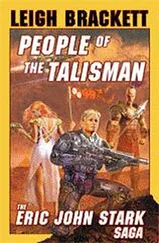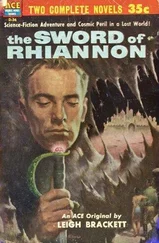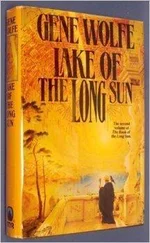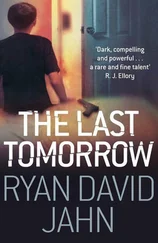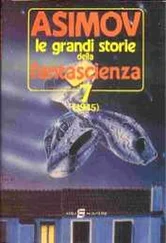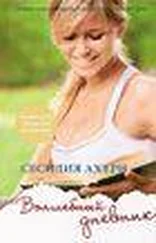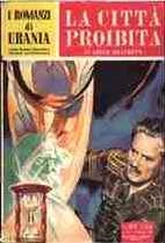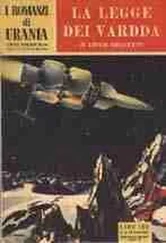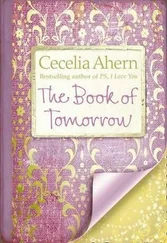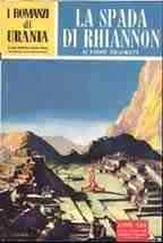He turned around. “Can you hear voices with it?”
“I haven’t yet,” said Esau. “But I’m going to keep on till I do.”
They tried that afternoon, cautiously turning one knob and then another. Esau had turned one too far, or Len would never have heard it. They had not the remotest idea how a radio worked or what the knobs and openings and the spool of thin wire were for. They could only experiment, and all they got was the now-familiar crackle and hiss and squeal. But even that was a thing of wonder. It was a sound never heard before, full of mystery and a sense of great unseen spaces, and it was made by a machine. They did not leave it until the sun was so low that they were afraid to stay any longer. Then Esau hid the radio carefully in a hollow tree, wrapping it first in a bit of canvas and making sure that the main knob was turned clear around till it clicked and there was no more sound, lest the hum and crackles should attract the attention of some chance hunter or fisherman.
That hollow tree became the pivot of Len’s days, and it was the most exciting and wildly frustrating thing imaginable. Now that he had a reason for going, it seemed almost impossible to find time and excuses for going to the woods. The weather turned cold and nasty, with rain and sleet and then snow. The stock had to be put in the barn, and after that there was not much time to do anything but feed, water, and clean up after a great houseful of animals. There was milking, and the hen house to see to, and then there was helping Ma with the churning and carrying stovewood, and such, around the house.
After morning chores, when it was still hardly light, he tramped the mile and a half to the village over roads that were one day deep in mud and frozen hard as iron the next, with yesterday’s ruts immortalized in ice. On the west side of the village square, beyond the smithy but not so far as the cobblers’ shop, was the house of Mr. Nordholt, the schoolmaster, and there, with the other young of Piper’s Run, Len struggled with his sums and his letters, his reading and his Bible history until noon, when he was turned loose to walk home again. After that there were other things. Len often felt that he had more to do than Pa and brother James put together.
Brother James was nineteen and arranging to marry the oldest daughter of Mr. Spofford, the miller. He was a lot like Pa, square and strong and quiet, proud of his fine new beard in spite of the fact that it was nearly pink. When the weather was right, Len went with him and Pa to the wood lot, or around to mend fence or clear hedgerows, and sometimes they would go hunting, both for meat and for skins, because nothing was ever wasted or thrown away. There were deer, and coon, and possum, and woodchuck at the right time of the year, and squirrel, and rumors of bear in the wilder parts of the Pennsylvania hills that might be expected to drift west into Ohio and sometimes if the winter was very bad they would hear rumors of wolves up north beyond the lakes. There were foxes to keep out of the henroost, and rats to keep out of the corn, and rabbits out of the young orchard. And every evening there was milking again, and the windup chores, and then dinner and bed. It did not leave much time for the radio.
And yet waking or sleeping it was never out of his mind. Two things were linked with it, a memory and a dream. The memory was the death of Soames. Time had transfigured him until he was taller and more noble and splendid than any ginger-haired trader had ever been, and the firelight on him had merged into the glory of martyrdom. The dream was of Bartorstown. It was pieced together out of Gran’s stories, and bits of sermons, and descriptions of heaven. It had big white buildings that went high up in the air, and it was full of colors and sounds, and people strangely dressed, and it blazed with light, and in it there was every kind of thing that Gran had told about, machines and luxuries and pleasures.
The most agonizing part of the little radio was that both he and Esau knew that it was a link with Bartorstown and if they only understood how to use it they could actually hear people talking from it and about it. They might even learn where it was and how a person might get there if he decided to go. But it was as hard for Esau to come to the woods as it was for Len, and in their few stolen moments they got nothing from the radio but meaningless noises.
The temptation to ask Gran questions about radios was almost more than Len could hold in. But he did not dare, and anyway he was sure she wouldn’t know any more about it than he did.
“We need a book,” said Esau. “That’s what we need. A book that tells all about these things.”
“Yes,” said Len. “Sure. But where are you going to get one?”
Esau didn’t answer.
The great cold waves rolled down from the north and northwest, one after the other. Snows fell and then melted in a warmer blow from the south, and then the slush they left behind them froze again as the temperature plunged down. Sometimes it rained, very cold and dreary, and the bare woods dripped. The manure pile behind the barn grew into a brown and strawy alp. And Len thought.
Whether it was the stimulus of the radio, or simply that he was growing up, or both, he saw everything about him in a new way, as though he had managed to get a little distance off so that his sight wasn’t blurred by being so close. He did not do this all the time, of course. He was too busy and too tired. But now and then he would see Gran sitting by the fire, knitting with her old, old unsteady hands, and he would think how long she had been alive and all she had seen, and he would feel sorry for her because she was old and Baby Esther, a minute copy of Ma in her tiny cap and apron and full skirts, was young and just beginning.
He would see Ma, always working at something, washing, sewing, spinning, weaving, quilting making sure the table was loaded with food for hungry men, a thick, solid, woman, very kind and quiet. He would see the house he lived in, the familiar whitewashed rooms of which he knew every crack and knothole in the wooden walls. It was an old house. Gran said it had been built only a year or two after the church. The floors ran up and down every which way and the walls leaned, but it was still sound as a mountain, put together out of great timbers by the first Colter who had come here, many generations before the Destruction. Yet it was not too different from the new houses that were built now. The ones that had been built in Gran’s childhood or just before were the ones that really looked queer, little flat-roofed things that had mostly to be re-sided with wood, and their great gaping windows boarded in. He would stretch up and try to touch the ceiling, figuring that by next year he could do it. And a great wave of love would come over him, and he would think, I’ll never leave here, never! And his conscience would hurt him with a physical pain because he knew he was doing wrong to fool with the forbidden radio and the forbidden dream for Bartorstown.
For the first time he really saw Brother James and envied him. His face was as smooth and placid as Ma’s, without a glimmer of curiosity in it. He would not care if there were twenty Bartorstowns just across the Pymatuning. All he wanted was to marry Ruth Spofford and stay right where he was. Len felt dimly that Brother James was one of the happy ones who had never had to pray for a contented heart.
Pa was different. Pa had had to fight. The fighting had left lines in his face, but they were good lines, strong ones. And his contentment was different from Brother James’s. It hadn’t just happened. Pa had had to sweat for it, like getting a good crop from a poor field. You could feel it when you were around him, if you thought about it, and it was a fine thing, a thing you would like to get hold of for yourself.
Читать дальше
